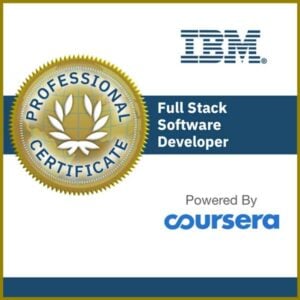The IBM Full Stack Software Developer Professional Certificate is a comprehensive program offered on Coursera, designed to equip learners with the skills and knowledge required to become proficient full-stack developers. Covering both front-end and back-end development, the program includes web development, version control, cloud computing, software programming, and web frameworks. Each module includes video lectures, readings, quizzes, and hands-on projects. The program concludes with a capstone project and a final assessment, providing learners with the opportunity to apply their newly acquired skills in a practical setting.
The program’s instructors are professionals from IBM, delivering clear and industry-relevant content. Learners can develop a solid foundation in full-stack development and gain insights into various technologies. The self-paced nature of the program makes it suitable for self-motivated learners.
With its hands-on projects and a certificate with some name recognition, it’s an ideal choice for individuals aspiring to pursue a career in full-stack development. While there are other online course options available – and I would recommend that anyone serious about a career in the area complement their studies with some of these – the IBM Full Stack Software Developer Certificate stands out due to its practical projects and the credibility of the IBM certification. From cloud computing and web development to software engineering and application development, the blend of theoretical knowledge and practical skills makes it a well-rounded and valuable learning experience.
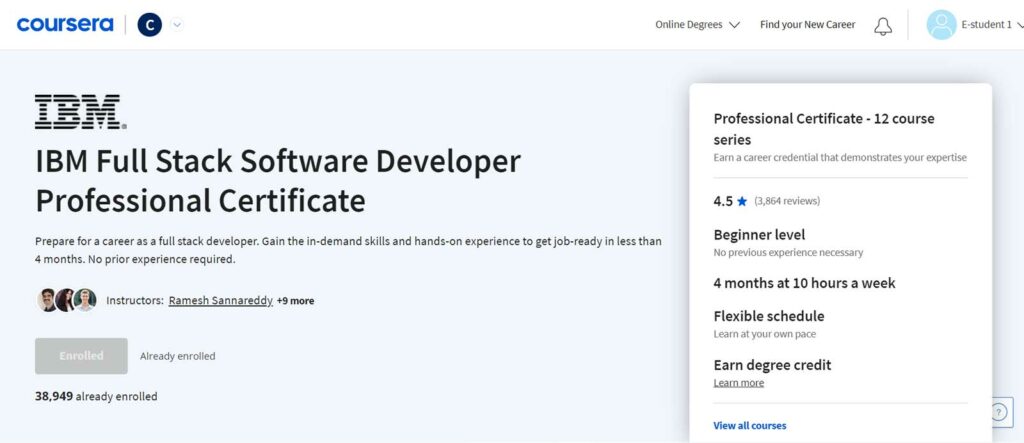
Table of Contents
Overview of the IBM Full Stack Software Developer Professional Certificate
The IBM Full Stack Software Developer Professional Certificate program consists of a series of 12 courses. The program begins with an introduction to web development, covering front-end and back-end aspects, including HTML, CSS, JavaScript, and web frameworks. Learners can explore cloud computing on the IBM Cloud platform, gaining practical deployment and management skills. The programming sections focus on Python and JavaScript, providing a solid foundation in these widely used languages. Additionally, learners explore software engineering principles and practices, culminating in the development of a full-stack application.
Notably, it is ACE® recommended, which means successful completion can earn learners up to 18 college credits (depending, however, on whether your university decides to recognize them), making it an excellent option for individuals seeking to enhance their educational qualifications.
Throughout the program, learners have the opportunity to develop a portfolio of hands-on projects, showcasing their practical skills as developers. Upon completing the IBM certification, learners can also share their completion certificate on professional platforms like LinkedIn, thanks to the digital badge you’re awarded.
The program is conducted in English, with the added benefit of subtitles available in multiple languages, including English, Spanish, French, German, and more. This inclusive approach ensures that learners from diverse linguistic backgrounds can engage with the course materials and benefit from the instruction – note, however, that not all material is translated.
One of the program’s standout features is the emphasis on hands-on exercises and projects, which provide invaluable practical experience and reinforce understanding. These challenges may be demanding, but they are equally rewarding, giving learners a true sense of accomplishment upon completion. The overall production value of the course is high, with clear video and audio, well-organized materials, and a user-friendly platform.

How much does the Professional Certificate cost?
Now, let’s address the issue of pricing. While it’s true that the program carries a premium price, it is essential to consider the comprehensive curriculum, capstone projects, and the credibility of the IBM certification. These factors combine to offer significant value for money, making the investment worthwhile for individuals serious about pursuing a career in full-stack development.
For those considering enrolling in the IBM Full Stack Software Developer Professional Certificate program, it is worth noting that it is available on Coursera through a subscription model priced at $49 per month. On average, learners complete the program within four months, resulting in a total cost of $196
Note that this Professional Certificate is not included in Coursera Plus subscriptions but needs to be purchased separately. On the other hand, if you are on a budget, as it is self-paced, you can aim to complete the program in less than the recommended four months to save money. As for most Coursera courses, it is also possible to audit the individual courses of the Professional Certificate for free. To help learners make an informed decision, Coursera thoughtfully also offers a 7-day free trial, allowing them to review the course material before committing to a paid plan.
Detailed review
Syllabus overview
The complete Certificate program has 12 component courses (including the capstone project and the assessment):
- Introduction to Cloud Computing
- Introduction to Web Development with HTML, CSS, JavaScript
- Getting Started with Git and GitHub
- Developing Front-End Apps with React
- Developing Back-End Apps with Node.js and Express
- Python for Data Science, AI & Development
- Developing AI Applications with Python and Flask
- Developing Applications with SQL, Databased, and Django
- Introduction to Containers w/ Docker, Kubernetes & OpenShift
- Application Development using Microservices and Serverless
- Full Stack Cloud Development Capstone Project
- Full Stack Software Developer Assessment
To give you a better idea of the program, we’ll go through each of these courses in more detail below.
Course 1: Introduction to Cloud Computing
The IBM Full Stack Software Developer Professional Certificate starts with an in-depth exploration of cloud computing, which lays a solid groundwork for the rest of the program. This initial five-week course delves into the core principles of cloud computing, emphasizing both its technical aspects and its strategic business implications and innovation potential. The course offers a detailed overview of cloud service models, including Software as a Service (SaaS), Platform as a Service (PaaS), and Infrastructure as a Service (IaaS). Learners also gain insights into various cloud deployment models, such as public, private, and hybrid clouds, providing a comprehensive understanding of cloud infrastructure components.
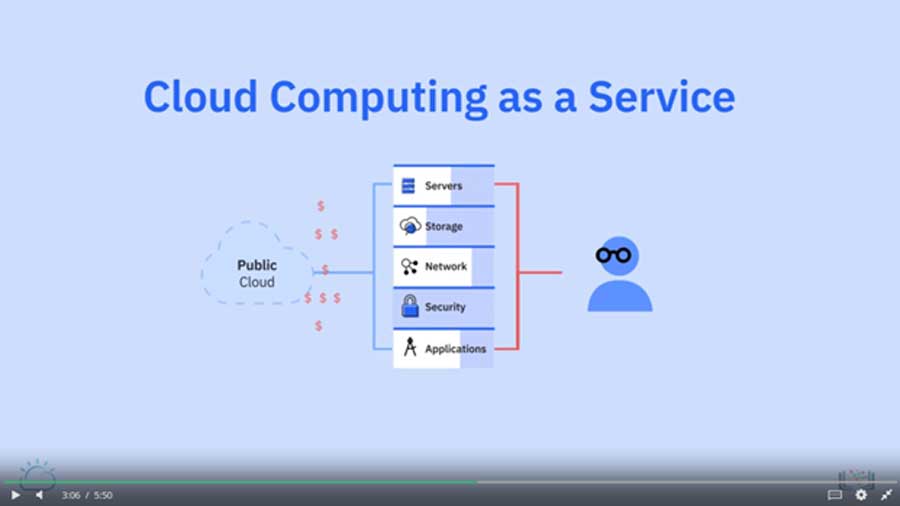
Furthermore, learners have the opportunity to learn about making informed decisions about the most suitable cloud platform for specific use cases through a comparative analysis of leading cloud platforms like Amazon Web Services (AWS), Microsoft Azure, Google Cloud, IBM Cloud, and Alibaba Cloud. The course also covers advanced concepts in cloud computing, such as microservices, serverless computing, and multi-cloud environments, preparing learners for practical applications in developing cloud-native applications.
The final stages of the course present real-world case studies related to cloud computing, focusing on security measures for building robust systems and effective monitoring strategies. A comprehensive final assessment allows learners to gauge their understanding and readiness for the subsequent courses in the certification program.
Course 2: Introduction to Web Development with HTML, CSS, JavaScript
The second course provides a comprehensive, hands-on introduction to the world of web development. It caters to aspiring web developers and offers a balance of theoretical knowledge and practical application. Over the span of five weeks, this 12-hour course immerses learners in the roles and responsibilities of front-end, back-end, and full-stack developers, showcasing the tools they utilize in their daily work.
Beginning with an overview of the web development ecosystem, the course familiarizes learners with the roles of front-end, back-end, and full-stack developers. It then delves into the specifics of HTML, offering a detailed look at scripting, browser support, and management. This is followed by an in-depth exploration of CSS and HTML5 elements, providing learners with the knowledge to create well-structured and interactive websites. The fourth week focuses on JavaScript, covering APIs, functions, prototypes, syntax, and DOM.
What sets this course apart is its emphasis on practical application. The course culminates in a final project where learners create a web application for a hypothetical client. This hands-on project allows learners to apply the HTML, CSS, and JavaScript skills they’ve acquired, providing them with invaluable practical experience.
Course 3: Getting Started with Git and GitHub
This three-week course focuses on a crucial platform for collaborative web development, exploring the essentials of Git, a distributed version control system integral to managing small and large software projects. Learners gain a solid understanding of Git commands, repositories, branching, merging, and cloning workflows.
The course introduces popular version control tools, with a particular focus on Git and GitHub. Learners are guided through creating a GitHub account and using the web interface to manage repositories, add files, and commit changes. They also learn about branches, key features of Git-based version control systems, and how to collaborate effectively with other developers.
Throughout the course, learners gain practical experience with Git commands for cloning and forking repositories, as well as committing, pushing, and pulling changes using the command line. The final project allows learners to apply their newfound skills by creating a GitHub Project, sharing files like an open-source license, and showcasing their abilities.
Course 4: Developing Front-End Apps with React
In this course, learners will delve into the exciting world of front-end development using the popular React framework. Through a comprehensive learning experience, they will gain proficiency in creating dynamic and interactive web applications. The course covers essential concepts such as communication and data exchange with external services using various HTTP methods like GET, POST, UPDATE, and DELETE requests.
One of the highlights of this course is the in-depth exploration of React concepts and features, including props, states, hooks, forms, and Redux. Learners will understand how React efficiently manages data through states and props, enabling smooth component updates and inter-component data flow. Additionally, they will gain hands-on experience with the three phases of a component’s lifecycle and the corresponding methods used in each phase.
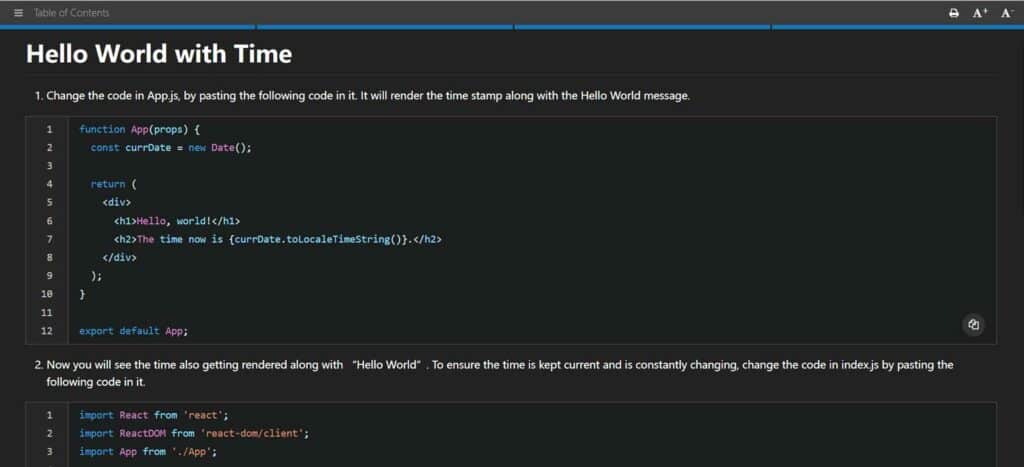
As the course progresses, learners will discover advanced techniques like using Hooks to handle events and logic in functional components, eliminating the reliance on classes. They will also delve into Redux, a centralized state management system that enhances the management of component properties.
The course culminates in an exciting final project, providing learners with the opportunity to create their own React Budget Allocation app. This hands-on project allows them to apply their knowledge of React components, state management using the Context API, and key concepts like actions, reducers, and the dispatch function.
Course 5: Developing Back-End Apps with Node.js and Express
This course equips learners with the necessary skills to create server-side applications using Node.js and extend them with the powerful Express framework. Through hands-on practice and effective package management using npm, learners will gain a comprehensive understanding of back-end web development.
Structured over four weeks, the course begins with an introduction to server-side JavaScript and delves into the intricacies of building a web server using Node.js and working with modules. Learners will harness the power of package managers to streamline their development process.
The course covers asynchronous I/O and callback programming components, vital for handling data in back-end applications. Techniques for parsing JSON data from HTTP messages are explored, a crucial skill for efficient data management. Later, the focus shifts to the Express web application framework, empowering learners to handle dynamic content through the exploration of routing, middleware, and template rendering.
Finally, the course concludes with an exciting final project, allowing learners to showcase their newly acquired skills by building their back-end solutions. This practical project serves as an opportunity to demonstrate their understanding of Node.js and Express and put their skills to the test.
Course 6: Python for Data Science, AI & Development
This beginner-friendly course provides a solid foundation in Python programming, a widely used language in the programming and data science world. Learners will acquire the skills necessary to apply Python in various domains, including data science, data analytics, software development, data engineering, AI, and DevOps.
The course consists of five modules, each covering essential concepts and techniques. The first module introduces learners to Python basics, including data types, expressions, variables, and data structures. The second module delves into Python data structures such as lists, tuples, dictionaries, and sets, enabling efficient data manipulation. The course then covers Python programming fundamentals, conditions, branching, loops, functions, objects, classes, and exception handling, crucial for building robust Python applications.
Learners will explore working with data in Python, learning how to read and write files, and gaining practical experience with popular Python libraries like Pandas and Numpy for data manipulation and mathematical operations. The final module delves into unique ways of collecting data using APIs and web scraping techniques, expanding learners’ data collection capabilities. Throughout the course, learners will have the opportunity to practice and apply their knowledge through hands-on labs using Jupyter Notebooks. This practical approach reinforces learning and provides a real-world context for using Python.
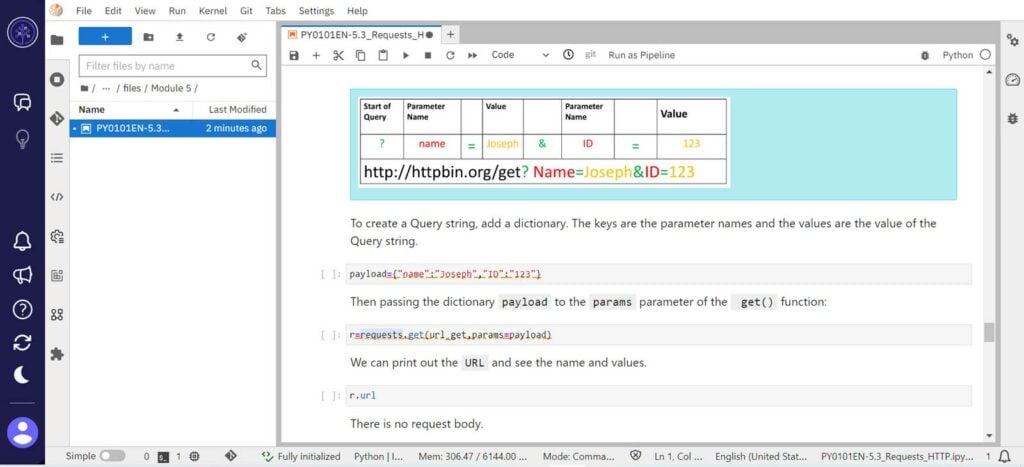
I find this course to be an excellent starting point for beginners looking to venture into Python programming and its applications in diverse fields. The practical labs and clear explanations make it accessible and engaging for learners with no prior programming experience.
Course 7: Python Project for AI & Application Development
The Python Project for AI & Application Development is a practical and hands-on mini-course that offers learners the opportunity to apply their Python skills in developing AI-powered applications. With a focus on building web applications using Python, Flask, and Watson AI libraries, this course equips learners with valuable knowledge and experience in the realm of artificial intelligence.
Before enrolling in this course, it is recommended to have completed the prerequisite course, “Python for Data Science, AI and Development” from IBM or possess equivalent proficiency in Python and data handling. This ensures that learners have the foundational Python skills required to fully engage with the project-based coursework.
The course begins by introducing learners to packaging, unit testing in Python, and Flask, a microweb framework. Packaging allows Cloud Application Developers to create coding units that can be easily tested and integrated into larger codebases. The course also covers unit testing to ensure error-free code integration within extensive projects. Flask, being an open-source Python package, empowers learners to create web applications with ease. In the second module, learners delve into advanced concepts, including unit testing, module packaging, and web application building. Hands-on experience with micro web frameworks like Flask enables learners to gain practical insights into packaging components effectively.
The highlight of this course is the final assignment, where learners are tasked with building their own Python web application using the knowledge gained throughout the course. This real-world scenario allows learners to apply their skills and solidify their understanding of the covered concepts. By the course’s end, learners will have amassed valuable experience to add to their portfolio and be well-equipped to build and deploy AI-powered web applications.
Course 8: Developing Applications with SQL, Databases, and Django
An integral addition to the IBM Full Stack Software Developer Professional Certificate program, the “Developing Applications with SQL, Databases, and Django” course focuses on fundamental concepts of databases, SQL, and object-relational mapping (ORM) using Django.
Learners should have prior knowledge of GitHub, Python, HTML, and CSS, as these topics are covered in the earlier learning materials of the Full Stack Software Developer program. This prerequisite ensures learners have the necessary foundation to effectively engage with the course content.
Throughout the course, learners gain a solid understanding of creating entity-relationship data models for relational databases and executing common database operations using SQL. The course also emphasizes leveraging Django ORM to work with databases through object-oriented programming (OOP) languages like Python. This bridging of OOP and SQL enables developers to manipulate database objects without resorting to writing SQL code.
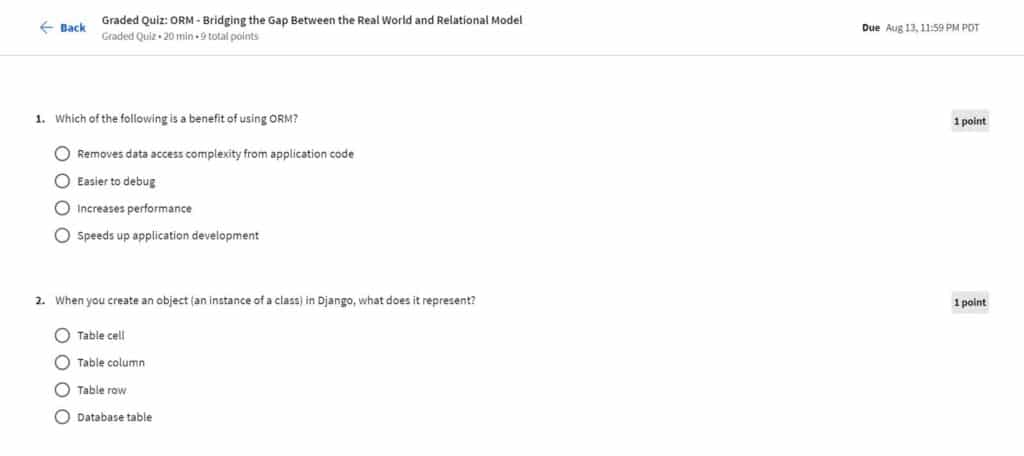
The course places a strong emphasis on hands-on learning, with practical labs and a final project allowing learners to apply their knowledge in real-world scenarios. By creating a Django web app and deploying it on the cloud, learners gain valuable full-stack Django skills.
The well-structured course spans five modules, covering SQL, database concepts, Django models, views, templates, authentication, authorization, and the integration of Bootstrap for building interactive web pages. Each week builds upon previous knowledge, resulting in a cohesive learning experience. With a duration of approximately 14 hours spread over five weeks, learners progress at a manageable pace, fully grasping the concepts taught in each module. The final project in Week 5 serves as a culmination, enabling learners to showcase their skills by enhancing their Django app with new features and capabilities.
Course 9: Introduction to Containers w/ Docker, Kubernetes & OpenShift
The ninth course in the IBM Full Stack Software Developer Professional Certificate is a highly valuable and relevant program for software engineers and developers seeking to enhance their containerization skills. The course comprehensively covers fundamental concepts and practical applications of using containers to facilitate swift application deployment across various environments.
A standout aspect of this course is its focus on building cloud-native applications using popular containerization tools and technologies such as Docker, Kubernetes, OpenShift, and Istio. These tools are widely used in the industry, and proficiency in them can significantly boost career prospects, evident from the high average salary for jobs requiring container skills.
The course comprises five modules, each covering essential aspects of containerization. Learners gain a solid understanding of container concepts, features, use cases, and benefits in the first module. Subsequent modules delve into Docker, Kubernetes, and OpenShift, exploring their architectural components, CLI commands, and advanced features like ReplicaSets, autoscaling, rolling updates, ConfigMaps, Secrets, and service bindings.
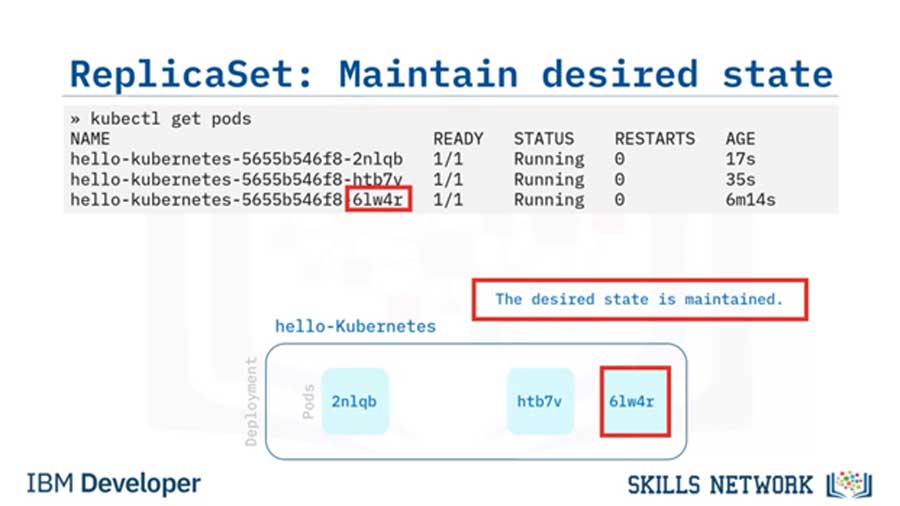
Hands-on, browser-based labs allow learners to apply their knowledge effectively, building container images, deploying applications, and scaling them on the cloud using OpenShift. The final assignment requires learners to deploy a simple guestbook application using Kubernetes and Docker, demonstrating their ability to implement the tools and concepts learned during the course.
The skills taught in this course are highly relevant to various roles, including software development, back-end, and full-stack development, cloud architects, cloud system engineers, DevOps practitioners, and site reliability engineers. The demand for professionals with containerization skills is rapidly growing, with more than 70 percent of Fortune 100 companies running containerized applications.
The course content is well-structured, with instructors providing clear explanations of complex concepts. The inclusion of hands-on labs ensures learners can practically apply their knowledge, solidifying their understanding of the material. Additionally, the course provides insights into the similarities and differences between OpenShift and Kubernetes, further expanding learners’ knowledge of the evolving Kubernetes ecosystem.
Course 10: Application Development using Microservices and Serverless
This course provides a valuable opportunity for learners to delve into the world of microservices and serverless development, gaining essential knowledge and skills in cloud-native application development. The content is engaging and relevant, covering important topics in application development while exploring continuous integration and delivery strategies, providing learners with a holistic understanding of modern software development practices.
The course is well-structured, offering a logical progression of concepts and practical exercises. It begins with an introduction to microservices, highlighting their advantages and contrasting them with monolithic architectures. Learners gain a clear understanding of how microservices break down larger applications into smaller, independently maintainable, and scalable pieces, offering benefits such as cost efficiency and team autonomy.
In the subsequent modules, the course delves into serverless computing, exploring its advantages and how it allows developers to run applications without managing the underlying infrastructure. Learners also get hands-on experience with serverless frameworks and their use cases, providing practical insights into leveraging serverless technologies for application development.
The course goes beyond theory, offering hands-on labs that allow learners to practice and apply the concepts they have learned. Through these labs, learners create REST APIs using Python and Flask, document and test APIs using Swagger, and deploy microservices using Docker containers and serverless technologies like the IBM Cloud Code Engine. This practical approach enables learners to gain valuable experience in developing and deploying microservices and serverless applications.
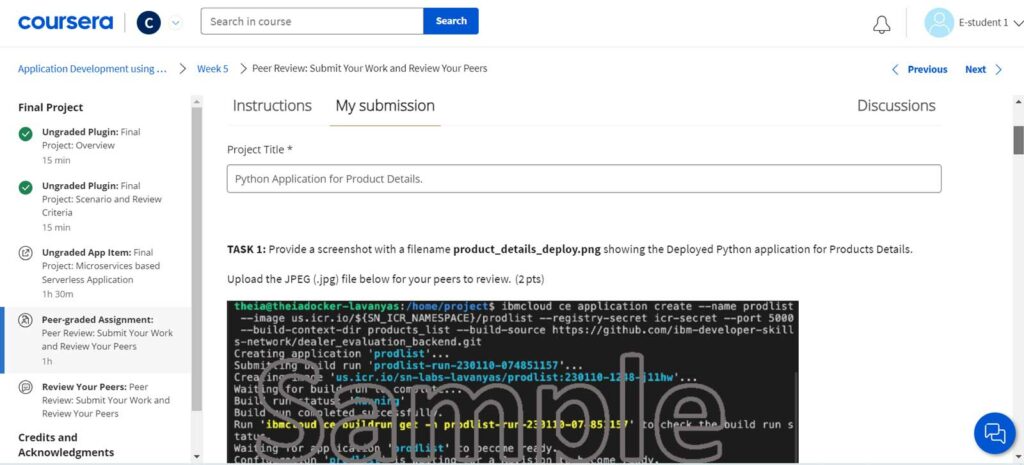
The final project serves as a comprehensive assessment, bringing together all the skills acquired throughout the modules. Learners create a front-end application composed of multiple microservices and deploy them on the cloud using serverless technologies. This project allows learners to showcase their abilities in real-world scenarios, further solidifying their understanding of the concepts covered.
Course 11: Full Stack Cloud Development Capstone Project
As the culmination of the IBM Full Stack Software Developer Professional Certificate, the “Full Stack Cloud Development Capstone Project” provides learners with a platform to apply their skills to a real-world project. This comprehensive course focuses on building a full-stack web application using JavaScript, React.js, Python, Node.js, and Express. Additionally, learners gain hands-on experience in deploying their Django application on the cloud using containers and serverless technologies.
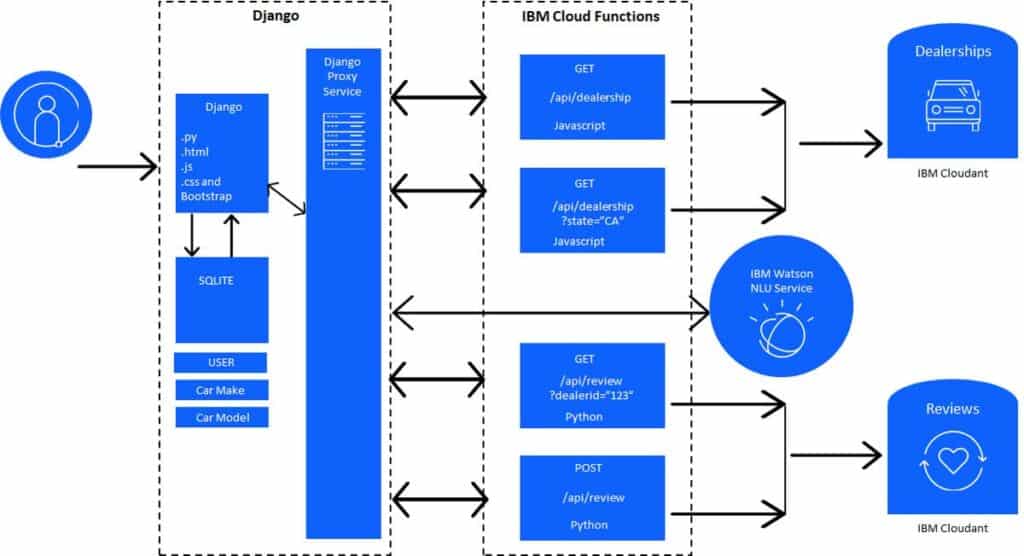
Throughout the course, learners embark on a challenging project that covers various aspects of full-stack development. From designing a dynamic user experience to implementing user management and authentication, developing backend services, and communicating with databases, learners acquire a wide range of expertise. The course also emphasizes continuous integration and deployment using CI/CD pipelines, a crucial aspect of modern software development.
The capstone project enables learners to demonstrate proficiency in designing application architecture, creating web frontends with HTML, CSS, and JavaScript, implementing user management and authentication, developing RESTful microservices, and communicating with databases. By completing the project, learners showcase their abilities in a real-world scenario, creating a working cloud-native application that serves as a showcase for potential employers.

The course is thoughtfully structured over six weeks, offering ample time for learners to grasp the concepts taught in each module. Completing all prior courses in the IBM Full Stack Software Developer Professional Certificate before attempting this capstone project is advised. Each week focuses on different components of the application, providing learners with a cohesive learning experience.
Course 12: Full Stack Software Developer Assessment
The final course in the IBM Full Stack Software Developer Professional Certificate serves as a comprehensive evaluation of the knowledge and skills acquired throughout the program. It is an intermediate-level course that covers a wide range of topics, including core cloud computing concepts, front-end and back-end web development languages (HTML, CSS, JavaScript, Python), frameworks (Node.js, React), and technologies (Docker, Kubernetes, OpenShift, SQL, Django, Serverless).
As the culminating course, the assessment requires learners to demonstrate their mastery of concepts related to web development, cloud computing, Python, Django, microservices, containers, CSS, HTML, and JavaScript GitHub. The assessment is approximately 4 hours long and includes valuable tips and guidance to help learners succeed. Upon successful completion of the assessment, along with the previous courses, learners will be awarded an IBM certificate.
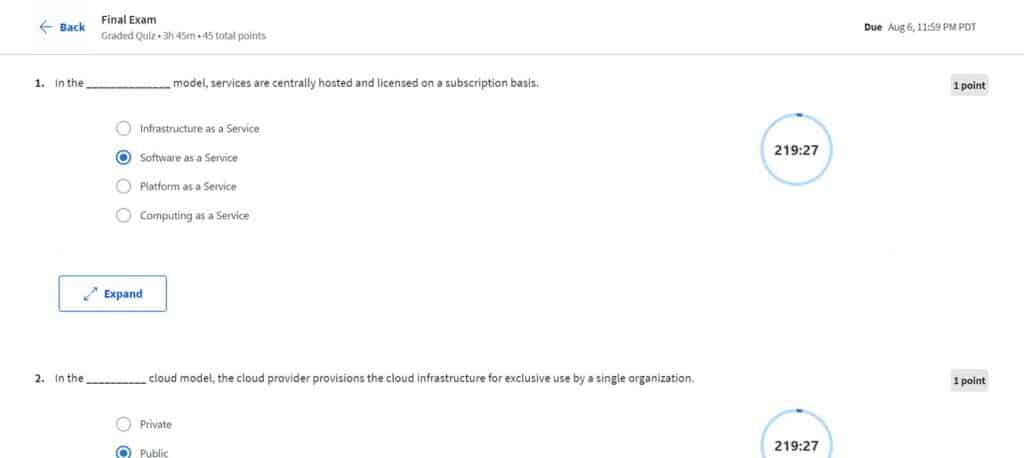
The Full Stack Software Developer Assessment is a rigorous and comprehensive evaluation that validates learners’ expertise in full-stack, front-end, and back-end application development. It serves as a fitting culmination to the program and provides learners with a tangible recognition of their skills.
What do others say?
The IBM Full Stack Software Developer Professional Certificate program on Coursera has received overwhelmingly positive reviews from learners. The program is praised for its comprehensive curriculum, practical hands-on projects, and the quality of instruction provided. One of the standout features of the program is its focus on practical application. Learners appreciate the opportunity to work on hands-on projects, allowing them to apply the skills they’ve learned in a real-world context. These projects also enable them to build a portfolio of work that showcases their abilities to potential employers. While some learners acknowledge that the program does require a significant time commitment and prior knowledge, they believe that the effort is well worth it for the valuable skills they acquire. The industry-recognized IBM certification adds further value to the program, making it a worthwhile investment for individuals committed to their careers in full-stack development.
Reviews of the program on other platforms, such as Reddit and Medium, echo the positive sentiment found on Coursera. Learners highlight the program’s comprehensive curriculum, hands-on projects, and the credibility of the IBM certification.
Overall, the IBM Full Stack Software Developer Professional Certificate program has garnered favorable reviews, both on Coursera and other platforms. It is considered a worthwhile investment for individuals serious about their careers in full-stack development.
Conclusion and recommendations
The IBM Full Stack Software Developer Professional Certificate stands out as a comprehensive and well-structured program that lays a solid foundation in full-stack development. It covers a diverse range of topics, spanning from cloud computing and web development to software engineering and application development. What sets this program apart is its emphasis on hands-on projects, allowing learners to apply their newfound skills in real-world scenarios.
One of the program’s strengths is its affiliation with IBM, ensuring that the content remains current and relevant in the rapidly evolving tech industry. Additionally, the industry-recognized certificate awarded upon completion adds significant value and serves as tangible proof of the learner’s expertise.
Undoubtedly, the program requires dedication, but the rewards are well worth it. The industry relevance, hands-on projects, and the added credibility of the IBM certification make it a worthwhile investment for aspiring full-stack developers. The program’s comprehensive approach ensures that learners gain the necessary knowledge and practical skills to thrive in the tech industry.
In light of these factors, I recommend the IBM Full Stack Software Developer Professional Certificate to anyone looking to pursue a fulfilling career in full-stack development and break into the dynamic and ever-growing tech industry. With its comprehensive curriculum and practical learning experience, this program provides an invaluable stepping stone toward achieving your goals.
40% ($140 USD) off your first year of Coursera Plus Annual (expires 2 December 2024)
